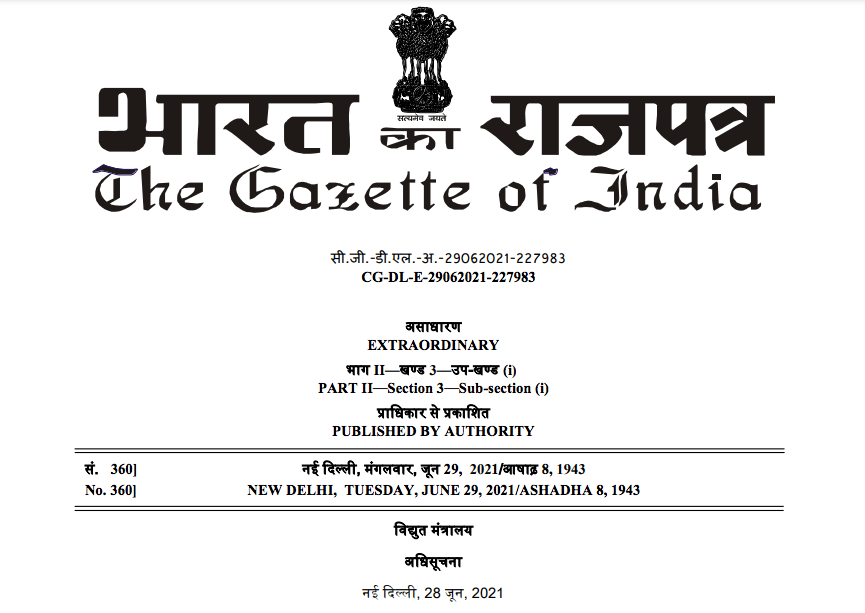29 June 2021: Union Ministry of Power has finally notified the much-awaited amendment to the Electricity (Rights of Consumers) 2020 Rules. In a gazette notification, the central government has approved Net Metering Up to 500 kW Capacity for Rooftop Solar Power Systems.
Electricity (Rights of Consumers) Amendment Rules, 2021
The notification also defines the terms net-metering, net-billing & gross -metering. As per the amendment:
Net-metering: means a mechanism whereby solar energy exported to the Grid from Grid Interactive rooftop Solar Photovoltaic system of a Prosumer is deducted from energy imported from the Grid in units (kWh) to arrive at the net imported or exported energy and the net energy import or export is billed or credited or carried-over by the distribution licensee on the basis of the applicable retail tariff by using a single bidirectional energy meter for net-metering at the point of supply
Gross-metering: means a mechanism whereby the total solar energy generated from Grid Interactive rooftop Solar Photovoltaic system of a Prosumer and the total energy consumed by the Prosumer are accounted separately through appropriate metering arrangements and for the billing purpose, the total energy consumed by the Prosumer is accounted at the applicable retail tariff and total solar power generated is accounted for at feed-in tariff determined by the Commission.
Net-billing or net feed-in: means a single bidirectional energy meter used for net-billing or net feedin at the point of supply wherein the energy imported from the Grid and energy exported from Grid Interactive rooftop Solar photovoltaic system of a Prosumer are valued at two different tariffs, where-
- The monetary value of the imported energy is based on the applicable retail tariff;
- The monetary value of the exported solar energy is based on feed-in tariff determined by the Commission;
- The monetary value of the exported energy is deducted from the monetary value of the imported energy to arrive at the net amount to be billed (or credited / carried-over)
Net Metering Up to 500 kW
The notification further states that the arrangements for net-metering, gross-metering, net-billing or net feed-in shall be in accordance with the regulations made by the State Commission, from time to time. In cases, where the regulations does not provide for net-metering, net-billing or net feed-in, the Commission may allow net metering to the Prosumer for loads up to five hundred Kilowatt or upto the sanctioned load, whichever is lower and net-billing or net feed-in for other load.
Hence, as per the new amendments, net metering will be allowed to the prosumer for loads up to 500 kW or up to the sanctioned load, whichever is lower, and gross metering for loads over 500 kW.
In the case of Prosumers availing net-billing or net feed-in, the notification allows Commissions to introduce time-of-the-day tariffs whereby Prosumers are incentivised to install energy storage for utilization of stored solar energy by them or feeding into the grid during peak hours thus helping the grid by participating in demand response of the Discoms.
The amendment further adds that in either case of net-metering or gross metering, DISCOM may install a solar energy meter to measure the gross solar energy generated from the grid-interactive rooftop solar system for renewable energy purchase obligation (RPO) credit, if any.
It is worth mentioning that Net metering for rooftop solar systems was capped at 1000 KWp until December 2020, when the government proposed to drastically cut & limit the capacity to 10 kWp. This seemed as a disastrous step for booming rooftop solar industry across the country and consequently government faces severe opposition & criticism.
Though the Central Government has amended the capacity rules, it depends on how fast State Electricity Regulatory Commissions like RERC release the amended orders in line with this order.
Read Ahead:
- Gazette Notification – Electricity (Rights of Consumers) Amendment Rules, 2021

